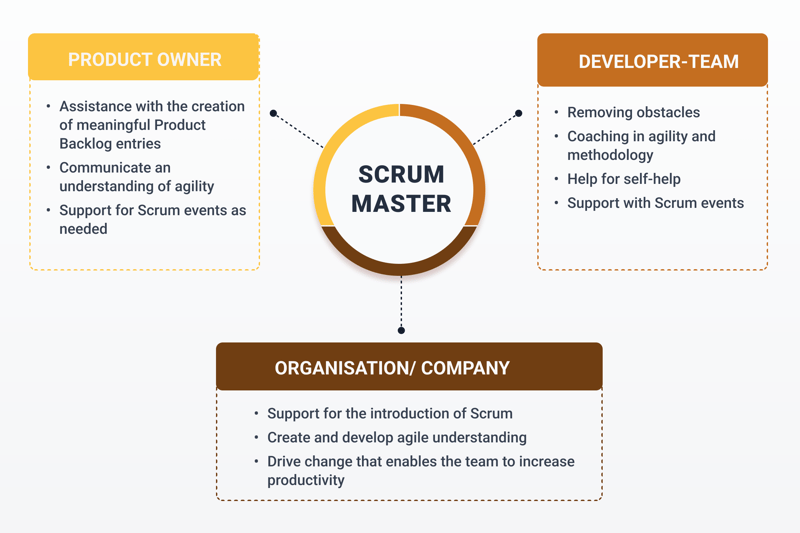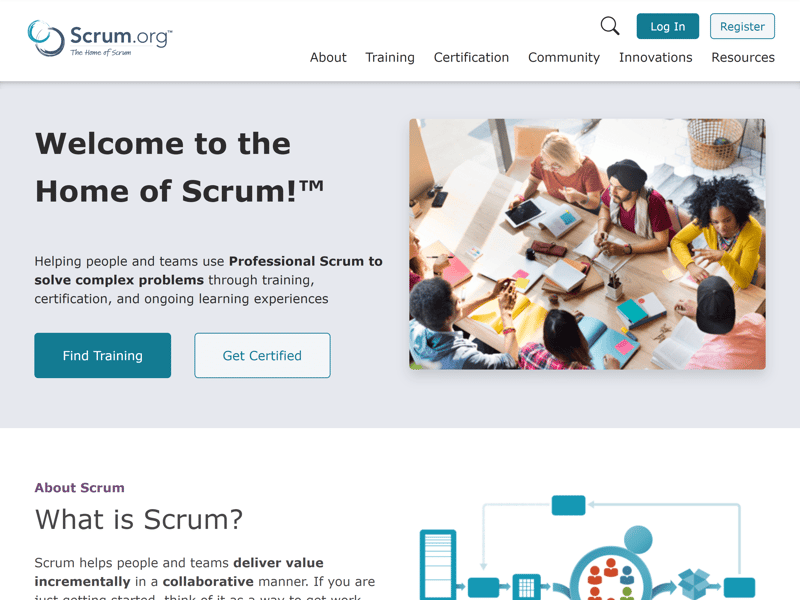What does a Scrum master actually do? Many see them as part moderator, part concierge, however, anyone familiar with Agile project management knows that they play a decisive role in teams and help them to remain cohesive. It isn't always clear how this works in practice, even for project management experts.
We've prepared this article to shed some light on a Scrum master's tasks and responsibilities. We'll distinguish it from the other roles in a Scrum team, take a look at what a Scrum master does in practice, and give you a few helpful tips and best practices along the way.
The Role of Scrum Master
In our Scrum guide, we took a closer look at the project management method's three main roles. These are:
Product owner
Development team
Scrum master
The Scrum master role is a highly versatile one and can be seen as a bridge between the other two roles and the overarching organization or company. Scrum masters are particularly important when it comes to Scrum's implementation and have a significant influence over other members of the team.
Because of their importance, we'll now review a Scrum master's tasks and responsibilities.
Tasks and Responsibilities of a Scrum Master
Since it combines multiple tasks and responsibilities, the position of Scrum master is often seen as as decisive.
Scrum Master as a Servant-Leader
Even though the title says Scrum master, some experts describe the role as that of a servant-leader. A Scrum master should provide his or her team with everything it needs to independently reach decisions and take responsibility for its work. Their focus must remain squarely on the team's needs at all times.
In other words, Scrum masters are not bosses or supervisors, but guides who help teams on their path towards success. This dissociation with the traditional image of a leader could explain why, since 2020, the term "servant leader" can no longer be found in the Scrum Guide.
The Scrum master doesn't lead the team per se, but interfaces between its various parts:

A Scrum master supports the product owner, development team, and organization.
A Scrum master ensures that stakeholders and participants develop an organizational understanding of agility and can implement it in practice. As intermediaries, they connect all of the other roles and positions. This allows them to not only improve communication but also work processes, that, in turn, can increase efficacy and efficiency.
Scrum Master as Intermediary
Other important tasks for Scrum masters in their team support function include the reduction of barriers to communication and conflict resolution. This requires a strong team dynamic, which is essential to any project's success. A Scrum master must keep the various interest groups in mind and steer every conversation in a positive/constructive direction.
This makes sense, as only constructive dialogs can help parties alleviate tension and reach more effective and amenable decisions. For this, a Scrum master gathers and forwards all of the necessary information, so that project participants have the same level of knowledge and misunderstandings can be avoided.
Scrum Master as Problem Solver
Has productivity slowed to a crawl because resources are in short supply? If so, a Scrum master can help eliminate the bottleneck. Another of their many tasks is to solve challenges that impede a project's progress and allow the team can go about its work with as few external distractions as possible.
A good example of this is the continuous improvement of development processes. The Scrum master identifies any challenges in advance, finds solutions, and makes sure that those responsible implement them. In this way, processes and teamwork can be optimized step-by-step, and new best practices can be developed.
Scrum Master as Moderator
At many organizations, the Scrum master is reduced to the role of moderator. Even though this is one of their responsibilities, it isn't their primary focus. Scrum teams generally self-organize and can moderate events on their own. In practice, however, product owners and development teams often request that Scrum masters moderate discussions or meetings.
There are four Scrum events that are to be held at regular intervals:
Sprint Planning
Daily
Sprint Review
Sprint Retrospective
The Scrum master can help prepare and moderate events. When they act as moderator, however, it's important that they do so independently of the team and that the latter doesn't look to the Scrum master for direction. A good moderator actively involves all participants and encourages open communication, without making judgments or voicing their opinion.
Help with decisions
So far as decision-making is concerned, Scrum masters can offer their know-how about particular techniques that might be appropriate in the current situation. Brainstorming and prioritization techniques are popular. Once again though, it isn't the Scrum master's responsibility to make decisions.
Role During the Daily
During the Daily Scrum, a Scrum Master makes sure that every participant can report their progress and any difficulties that they've encountered, otherwise known as the three standard question:
What did you do yesterday?
What will you do today?
What (if anything) is blocking your progress?
In a figurative sense, the Scrum master also ensures that everyone follows the principles and values of Scrum and the Agile Manifesto on a regular basis.
Scrum Master as Coach and Mentor
When seen as a coach, a Scrum master has two tasks: First, they make sure that all parties involved are aware of and know how to properly apply agility, Agile methods, and tools. This requires regular workshops and training events.
Second, Scrum masters also help team members achieve their goals, develop further, and maximize their potential. They encourage participants to try new ideas and, if requested, offer constructive feedback.
Scrum Master as Improviser
Just as in life, things don't always go smoothly for projects. Among their many skills, Scrum Masters are also experts in the art of improvisation. They'll help teams react to unforeseen events and come up with innovative solutions to any kind of problem.
Whenever a project's conditions suddenly change or something unforeseen happens, Scrum masters keep cool and focus on the big picture.
What Doesn't a Scrum Master Do?
In light of how much a Scrum master does, you might be tempted to ask where their responsibilities end. For that reason, we prepared a brief overview to show what a Scrum master isn't:
A leader, but rather a facilitator, who helps the team to organize itself.
A feel-good manager.
A project director.
There are also many misconceptions about what a Scrum master's responsibilities are. To clear things up, they:
Do not have the authority to give instructions or make decisions.
Cannot assign tasks.
Never have a dual role (such as product owner, or as a member of the development team).
Are not solely responsible for the project.
So, how does this differ from other project management roles?
Differences to Other Scrum and Project Management Roles
From the above, it seems that some of a Scrum master's tasks are identical to those of a product owner, member of the development team, Agile coach, or project manager, however, this isn't the case. While there is definitely overlap in certain areas, a Scrum master is different from each. Here are some ways you can distinguish between them.
Differentiation from a product owner (PO)
While the PO focuses on the product's vision, a Scrum master ushers the process forward smoothly and with as few obstacles as possible. The PO concentrates on the product and its customer's expectations whereas Scrum masters focus on the team, collaboration, and process optimization. Finally, the PO is responsible for the product backlog, while the Scrum master introduces techniques that can optimize this.Differentiation to the development team
The development team is responsible for how tasks are accomplished and a product's development. Scrum masters are not part of this team and have no authority to intervene in their work. Instead, a Scrum master helps the team to work as smoothly and efficiently as possible.Differentiation to an Agile coach
In practice, Agile coaches are often confused with Scrum masters. A Scrum master is responsible for Scrum's implementation within a team and is considered an expert in the framework. Even though the Scrum master can coach and promote Agile development, his or her focus is on the team level.
An Agile coach, on the other hand, tries to develop an Agile culture across an entire organization. He or she does not belong to a specific team but instead works on a temporary basis as a kind of consultant to senior management. Their primary responsibility is to start an Agile transformation, even for Agile frameworks that aren't Scrum.Differentiation to project managers or directors
In Scrum, project responsibility is divided between the Scrum master, PO, and development team. However, for classic project management, the manager is usually responsible. A Scrum master can't replace a project manager, since he or she doesn't have the same, comprehensive range of competencies.
A project manager or director also has certain authority in terms of direction and decision-making that a Scrum master lacks. Thus, even though Scrum projects don't have a manager or director, it's inaccurate to think of the Scrum master as filling this role.
Scrum's roles are different than those of other, more traditional approaches to project management. So, what does that mean in practice, and which challenges does it pose?
Challenges in Practice – And How to Handle Them
There are a number of common pitfalls that Scrum masters should be prepared for. These can see the role challenged with situations that aren't discussed in the Scrum Guide. To get the most out of your daily routine there are several practices and tips that have proven themselves over time.
Below, we'll introduce you to some of the most common challenges and let you know how to handle them:
Too much methodology
Some of the Scrum master's most important tasks are to make sure that the team understands Scrum's methodology and can use it effectively. However, too much emphasis can be placed on implementation, which comes at the cost of supporting the team, another key responsibility.
To avoid this, Scrum masters need to find a good balance that prioritizes both the team as well as Scrum's values.Too much focus on the team
At the opposite end of the spectrum, an equally grave problem can arise when a Scrum master prioritizes the team without taking account of the project and organizational landscape.
Participants should always be kept aware that other teams will benefit from their progress and process optimizations. Those who actively share knowledge, help the organization to grow and succeed.The team rejects Scrum guidelines or events
Many times, Scrum's guidelines and rules will be ignored or overlooked. Both the team and management might ask "Why do I need to answer these three questions every day?" or "Do we really need a Scrum Retrospective?"
So, how are Scrum masters supposed to respond? The best thing to do is to encourage open communication and to encourage decision-making as a team. Many times, some participants will be unable to see the necessity for certain processes or wish to simplify others. When you discuss these topics with them, compromises can be reached, such as leaner events.Lack of external perception
When a Sprint begins, organizational management might view the Scrum master as an assistant or moderator. Other managers won't understand the value or purpose of the role. As a result, communication and transparency can suffer. The easiest way to overcome this is through clear role definitions, information sessions, and workshops.Team members aren't fully available
The Scrum framework presupposes that all team members work solely on a particular project. However, things look a bit different in reality: Most of the time, team members participate in multiple projects concurrently and cannot be entirely integrated into planning.
In this scenario, try to schedule a workshop with management to promote a greater understanding of Scrum's processes. Most of the time, it won't be enough for only the team members to be aware of Scrum, but also, the organization's management as well.
Most of the time, the roots of challenges and problems such as those mentioned above can be found in a lack of instruction, knowledge, or information at the organizational level. This shows just how important it is for the Scrum Master to be knowledgeable about Scrum and its representative at the organization.
10 Tips for a Successful Scrum Master
Would you like to know what successful Scrum masters do? We gathered 10 tips that characterize experienced practitioners:
- 1.
Be an expert: Scrum masters should be more knowledgeable about the Agile Manifesto, Scrum processes, and the Scrum Guide than anyone else in the team or organization. They're able to find the right path forward at any time and show it to others.
- 2.
Don't be a know-it-all: True experts know that they can always learn something new. For that reason: Be an active listener, especially when the team makes suggestions, and consider whether they might optimize processes. Always remember, the team takes precedence over the manifesto!
- 3.
Give the team room to be creative: Experienced Scrum masters do not suggest ready-made solutions, but instead help guide the team towards the best option. This doesn't just require teamwork, but problem-solving skills and independence from the team.
- 4.
Work together as equals: In order for teamwork to be beneficial, all team members must work together as equals. This doesn't only mean that a Scrum master needs to respect and value all members of the team, but also actively work to promote an open and trustful atmosphere, especially for Retrospectives!
- 5.
Encourage experimentation: Agile processes thrive on change. Some ideas might look good on paper, but what kind of impact will they have in practice on existing processes? Scrum encourages experimentation. Successful teams try out new things and see what works. It might be necessary to take a step backward sometimes, however, this could prove to be just what's needed to make a breakthrough.
- 6.
Don't act unilaterally: A Scrum master should only reach decisions in agreement with the Scrum team so that everyone supports the path forward.
- 7.
Exchange knowledge and expertise: These days, everyone knows that success is only possible if knowledge is shared. Scrum masters learn from one another and encourage dialogs with other Scrum teams.
- 8.
Inspire team members: A team is only ever as motivated as its individual members. In concrete terms, this means that participants are encouraged to act independently and responsibly, which should translate into increased productivity and a lower error rate.
- 9.
Rotate moderators: Every member of the team should have a chance to be a moderator. This doesn't only increase awareness of all tasks within a team, but also, promotes better teamwork and communication. This is the reason why some Scrum masters take a more passive role or help team members refine their moderation skills.
- 10.
Be a supporter: An expert doesn't try to manage the team, but rather, supports it. He or she mediates whenever a conflict breaks out while making sure that his or her team can handle whatever tasks they're responsible for.
What's Required to Be a Scrum Master?
There isn't any explicit training or field of studies for Scrum masters. At the same time, there are certain courses and certifications for prospective Scrum masters.
On Scrum.org, you can get certified, starting with a Professional Scrum Master 1 (PSM I) certification and going up to PSM 3. The amount of detail increases with each level, however, participants can deepen and expand their knowledge of the Agile framework. Many preparatory courses are offered online, and there are a range of different sources for these.

Take (paid) certification tests on Scrum.org.
Certifications are well and good, however, prospective Scrum masters should carefully consider whether they have the necessary interpersonal skills to act effectively in conflict situations or as an intermediary. Whatever the case, Scrum masters need superior communication skills.
There aren't other prerequisites like a university degree. Anyone can sign up for an online course. In practice, businesses typically hire those with a certificate and a background in IT or project management.
Conclusion: A Versatile Role With a Lot of Responsibility
A Scrum team without a Scrum master? Good luck! The Scrum master is a highly versatile and often overlooked role. He or she supports the team during a project's implementation, clears away obstacles, sets guidelines, and makes sure that the team follows Scrum's principles. They liaise between the development team, PO, and the organization.
However, it's important to keep in mind that this role is neither a project manager nor an Agile coach. With some easy tips, Scrum masters can successfully navigate the challenges and pitfalls of everyday work and help their teams complete their projects and tasks.












